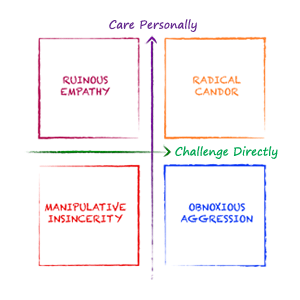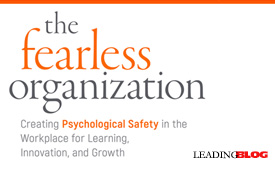 |
 |
04.05.17

Radical Candor
R The very heart of being a good boss is a good relationship, writes Kim Scott in Radical Candor. We need Radically Candid relationships with those we work with and because this is often scary and can be emotionally taxing, we resort to be ruinously empathetic or obnoxiously aggressive or manipulatively insincere. Of course, establishing trust with each person that reports to you is fundamental to radical candor. Radical Candor happens when you put Care Personally and Challenge Directly together. Care Personally refers to the fact that to have a good relationship “you have to your whole self and care about each of the people who work for you as a human being. Challenge Directly “involves telling people when their work isn’t good enough—and when it is. Challenging people might seem the opposite of Care Personally, but “challenging people is often the best way to show them that you care when you’re the boss.” Scott explains that she chose the word Radical “because so many of us are conditioned to avoid saying what we really think. This is partially adaptive social behavior; it helps us avoid conflict or embarrassment. But in a boss, that kind of avoidance is disastrous. She chose Candor because it is “necessary to communicate clearly enough so that there’s no room for interpretation, but also humbly.” Caring Personally is about acknowledging that we are all people with lives and aspirations that extend beyond those related to our shared work. It’s about finding time for real conversations; about getting to know each other at a human level; about learning what’s important to people; about sharing with one another what makes us want to get out of bed in the morning and go to work—and what has the opposite effect. Radical candor is not an invitation to be a jerk, or to nitpick, or to simply schmooze. (“A good rule of thumb for any relationship is to leave three unimportant things unsaid each day.”) What you say gets “measured at the listener’s ear, not at the speaker’s mouth.” Everything must be delivered in good faith.  Scott has created a framework to help you be more conscious of the kind of guidance you are getting, giving, and encouraging. There are two dimensions to good guidance: Care Personally and Challenge Directly. It is a way to gauge praise and criticism. Scott has created a framework to help you be more conscious of the kind of guidance you are getting, giving, and encouraging. There are two dimensions to good guidance: Care Personally and Challenge Directly. It is a way to gauge praise and criticism.
When you criticize someone without taking the time to show care, your guidance feels like Obnoxious Aggression. It’s what happens when you challenge but don’t care. It’s praise that doesn’t feel sincere or criticism that isn’t delivered kindly. “When bosses belittle employees, embarrass them publically, or freeze them out, their behavior falls into this quadrant.” And keep this in mind: “Almost nothing will erode trust more quickly than using one’s insights into what makes another person tick to hurt them.” Manipulative Insincerity is what happens when you neither care nor challenge. It’s an attempt to push the other person’s emotional buttons in return for some personal gain. It’s praise that is non-specific and insincere or criticism that is neither clear nor kind. Ruinous Empathy is what happens when you care but don’t challenge. “When bosses are too invested in everyone getting along, they also fail to encourage the people on their team to criticize one another for fear of sowing discord. They create the kind of work environment where ‘being nice’ is prioritized at the expense of critiquing, and therefore, improving actual performance.” It is praise that isn’t specific enough to help the person understand what was good or criticism that is sugarcoated and unclear. You may think Radical Candor would never work on your organization’s or team’s culture. And it probably won’t unless you first invest in the people you work with and show them that you care personally. But here’s the big hurdle: Start by explaining the idea and then asking people to be Radically Candid with you. Why you first? First, it’s the best way to show that you are aware that you are often wrong and that you want to hear about it when you are; you want to be challenged. Second, you’ll learn a lot—few people scrutinize you as closely as do those who report to you. Third, the more firsthand experience you have with how it feels to receive criticism, the better idea you’ll have of how your own guidance lands for others. Fourth, asking for criticism is a great way to build trust and strengthen your relationships. (Important: “If a person is bold enough to criticize you, do not critique their criticism.”) Scott carefully details ways to create a climate in which Radically Candid relationships can flourish. She provides many (most first-hand) examples of what worked and what didn’t work. From her experiences at Apple and Google, she observed that “a boss’s ability to achieve results had a lot more to do with listening and seeking to understand than it did with telling people what to do; more to do with debating than directing; more to do with pushing people to decide than with being the decider; more to do with persuading than with giving orders; more to do with learning than with knowing.” And there’s an app: Candor Coach. This app will show you how quick, frequent, face-to-face conversations can help you build a culture of Radical Candor. It will start by teaching you to ask for and give feedback. It will help you track the conversations you’re having with each person on your team so that you can see where you need to improve.   
Posted by Michael McKinney at 09:32 PM
|
BUILD YOUR KNOWLEDGE
 

How to Do Your Start-Up Right STRAIGHT TALK FOR START-UPS 
Grow Your Leadership Skills NEW AND UPCOMING LEADERSHIP BOOKS 
Leadership Minute BITE-SIZE CONCEPTS YOU CAN CHEW ON 
Classic Leadership Books BOOKS TO READ BEFORE YOU LEAD |